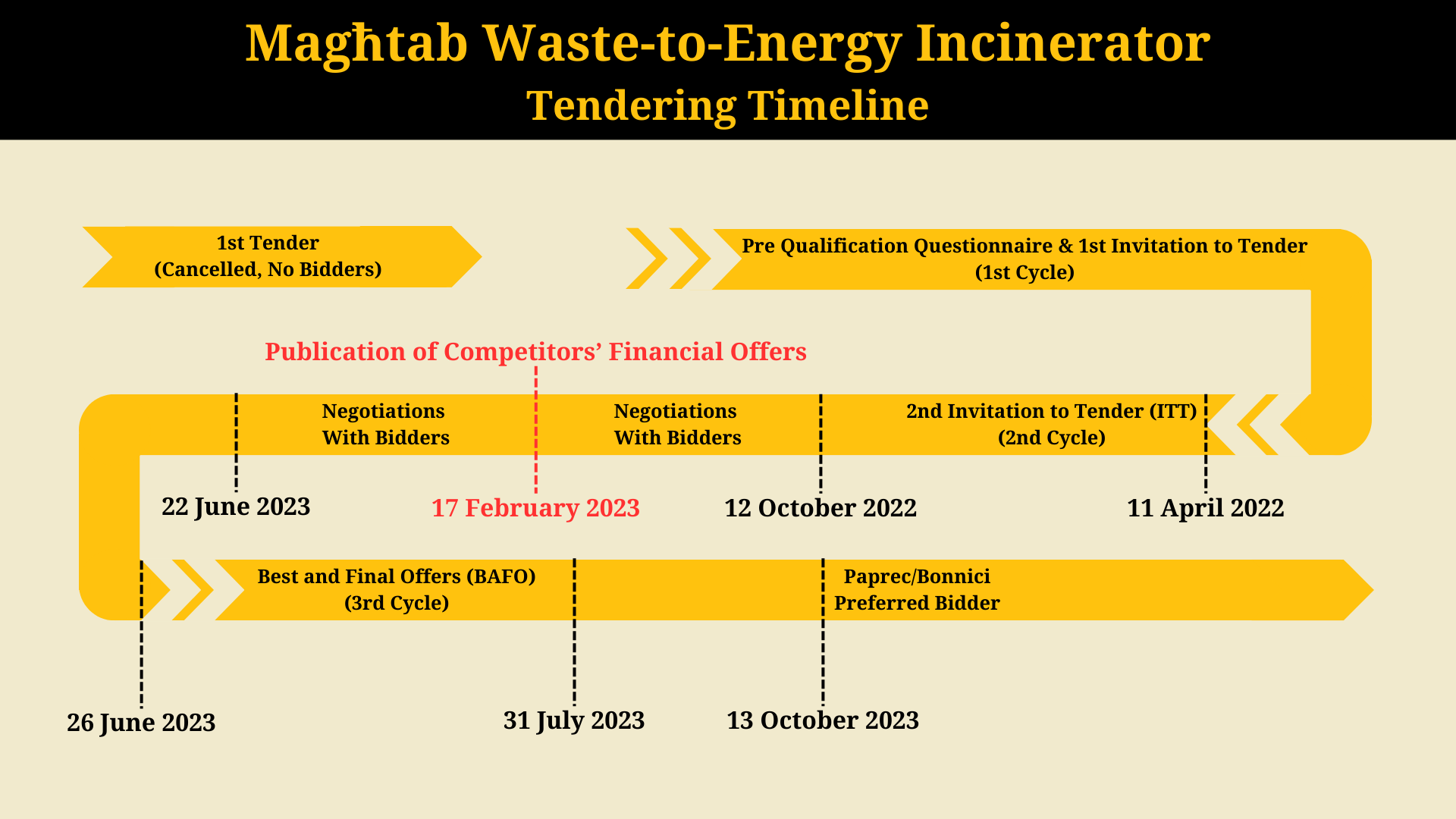The names of Wasteserv evaluation committee members that awarded an “irregular” €600 million tender for the Maghtab incinerator were the focus of a hearing on Thursday, with the majority not even employed by the agency.
The committee comprised individuals recruited through temping agencies or seconded from other government agencies, except for Wasterserv Chief Financial Officer Jonathan Scerri and the committee secretary.
The evaluation team set up by Wasteserv issued the recommendation for the preferred tender bidder. Their employments were revealed in a continuation of proceedings in front of the Public Contracts Review Board, currently reviewing the tender’s award to a consortium comprising French waste management company Paprec and local firm, Bonnici Bros.
The case was raised in front of the PCRB by Hitachi Zosen AG, the second-place bidder, after the Department of Contracts revealed the bidders’ sensitive financial data before negotiations were completed.
Their challenge claimed the “irregular” publishing “has the effect of distorting competition and preventing a fair process.”
The tender contract is one of the largest in Malta’s history. It involved a tendering process which included negotiations with the bidders, another first for the country.
On the morning of the third sitting of the PCRB’s longest hearing to date on Thursday, Hitachi, through legal counsel Adrian Delia and Matthew Paris, called several witnesses to the stand.
They asked for more information on the evaluation committee’s composition and work and the extent of the consultancies’ involvement.
Testifying at an earlier PCRB hearing last month, former director general at the Department of Contracts, Anthony Cachia, said that while the DoC oversees the process, “It’s always the contracting authority [Wasteserv] that chooses the evaluation committee.”
Jobs Plus Senior Executive Louis Buhagiar testified that three of the five Wasteserv’s evaluation board members were not actually employees.
CFO Jonathan Scerri and the evaluation committee Secretary Susan Portelli were the only two members officially employed by the agency.
Stefanie Scicluna Laiviera, who is part of the board for her procurement experience, is employed as a senior manager at the Water Services Corporation. Laiviera was the subject of an earlier complaint submitted by Hitachi, as she is also a substitute member of the PCRB.
Branica Xuereb, who testified at an earlier PCRB sitting last month on procurement matters, is employed at the Ministry for Tourism, while also being listed as a Wasterserv employee on their website.
Charlon Buttigieg, the engineer who replaced former Wasteserv engineer Stephen Dimech on the evaluation committee in 2022, is employed through OZO Resources Limited, a temping agency with ties to the government.
Buttigieg is one of the many employees for which Wasteserv pays a total of €2 million per month, contracted indirectly through third-party agencies.
Engineering and design consultancy COWI A/S advised the evaluative committee throughout.
COWI was initially billed by the government as an observer to the proceedings, but it later emerged they were engaged more as consultants, providing technical reports which included contractual, payment and financial details.
The hearings so far
The protracted sittings in front of the PCRB have so far revealed the government’s lack of experience with projects of its size, value, and scope.
The move to publish the sensitive financial information mid-process, initially labelled “a mistake” but later said to be in the interest of transparency, fuelled claims of backdoor deals for a preferred bidder to win, given Bonnici Bros’ history with government contracts..

The first-of-its-kind tendering process for the project included the publication of bidders’ sensitive financial data in the middle of the negotiations phase.
The tendering process for the waste-to-energy incinerator was the first of its kind for Malta, given it included a period of negotiations between the government and the bidders not typically found in other tender processes.
The procurement process included three cycles. An initial pre-qualification questionnaire (PQQ) and an invitation to tender (ITT) were followed by a second ITT along with competitive dialogue and negotiations. The best and final offers (BAFO) stage capped the tendering process.
At the BAFO stage and following the publication of the financial data, the Paprec/Bonnici consortium revised an earlier indicative price it had submitted, making its offer the most competitive.
The Paprec/Bonnici consortium was later awarded the tender.












